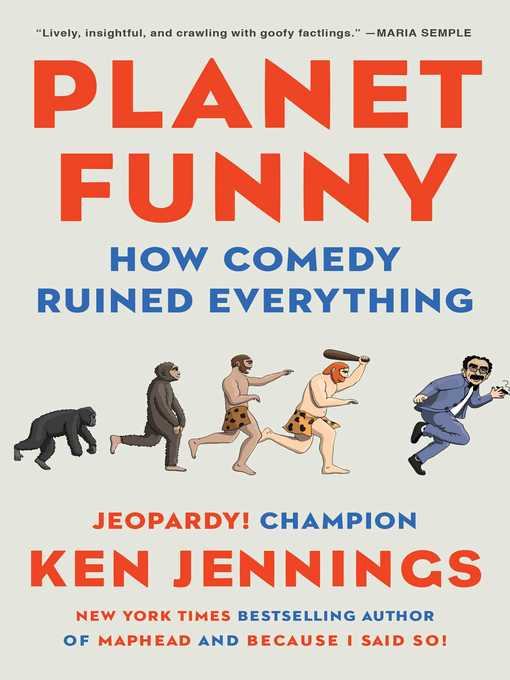
Planet Funny
How Comedy Took Over Our Culture
کتاب های مرتبط
- اطلاعات
- نقد و بررسی
- دیدگاه کاربران
نقد و بررسی

Starred review from April 2, 2018
Jeopardy! champion Jennings (Maphead) examines the evolution of humor, asserting that “today, in a clear sign of evolution totally sliding off the rails, our god is not strength, or efficiency... but funniness.” Rather than going down the rote historical path of key performances, movies, and sitcoms, Jennings goes deeper, attempting to nail down the slippery definition of “funny” and track how it’s evolved even though jokes often don’t age well or hold up to scrutiny. It’s a philosophical conundrum Jennings expertly navigates throughout the book, turning over concepts like the miasma of hipster irony (taken too far and “you wind up with a society so cynical that caring about anything seems suspect”), absurdity (a fragile and subjective sensibility “because we scarcely know what we’re laughing at ourselves”), and the accelerated frequency of jokes in modern sitcoms. He colors his narrative with fun and surprising asides, noting that Lincoln read a long-winded joke about a traveling salesman before introducing his revisions to the Emancipation Proclamation and the first celebrity roast was held in Athens in 423 B.C.E. Jennings’s remarkable research and clever hand make an impressive and highly entertaining work that pop culture enthusiasts will not want to miss.

April 1, 2018
In his second departure from quiz-show fare, Jennings (Because I Said So!: The Truth Behind the Myths, Tales, and Warnings Every Generation Passes Down to Its Kids, 2012, etc.) tracks the development of an abiding personal passion: comedy.The author assembles a concise but thorough history of the sweeping trends in American humor that have led to our present situation, in which comedy serves as the cultural lingua franca, so central to our ways of interacting, consuming, and producing that it is taken for granted. In this groundswell of "laughterhood," Jennings hears the rumblings of a not-so-distant time when we will reach "peak comedy," an opinion he shareswith Simpsons writer Tim Long: "I don't think you can go that much faster than people are going now." Jennings frets over oversaturation and whether the increasingly frenetic pace of comedy (measured in JPM, or jokes per minute) might feed into our widespread anxieties, with a worldwide web of people typing "that's funny" but never really laughing, too caught up in getting the next joke to pause and develop deeper senses of humor and too busy searching for the laugh to deal with the tragic or the truly serious. In a more hopeful projection, the author sees Twitter exchanges making us all funnier, its circulating joke cycle forming the training wheels for quick thinking, the learnable part of wit. Jennings downplays his fame as a "professional ex-game show contestant" (the winningest champion on Jeopardy! to date, for all the Rip van Winkles out there). A self-professed comedy geek, he switches from the funnyman's thinking guy to the thinking man's funny guy depending on whether the comedy or the geek is uppermost. Let us hope that the author has geeked out in some other areas he'd like to share with the class.This book is full of good sense and meaningful interviews, and it would be difficult to find a smarter or more satisfying treatment of a subject so evanescent and idiosyncratic as comedy.
COPYRIGHT(2018) Kirkus Reviews, ALL RIGHTS RESERVED.

April 15, 2018
Jeopardy champion and author Jennings (Brainiac: Adventures in the Curious, Competitive, Compulsive World of Trivia Buffs) applies his trivia knowledge to the comedy realm. He explains how comedy has evolved over the years by demonstrating that past pauses before laughs at stand-up shows have grown into measuring laughs per minute in today's popular sitcoms. Jennings intermixes personal stories, such as attending a sex-ed class with his son, going to Super Bowl parties, and the dilemma of picking out a funny birthday card with footnotes, facts, and in-depth explanations about stand-up, late-night comedy news shows, TV advertisements, and even presidential tweets. There are not many comparable books to this one, as its intention seems more to inform than to be humorous. The expression "if you have to explain the joke, it's no longer funny" is mentioned fairly early on, but the book continues to do just that--it explains jokes. Fans loyal to Jennings's other works, or those who appreciate pop culture case studies may enjoy this volume. VERDICT This book considers why we laugh, but readers who prefer to get a laugh should turn to titles by comedians.--Natalie Browning, Longwood Univ. Lib., Farmville, VA
Copyright 2018 Library Journal, LLC Used with permission.

























دیدگاه کاربران